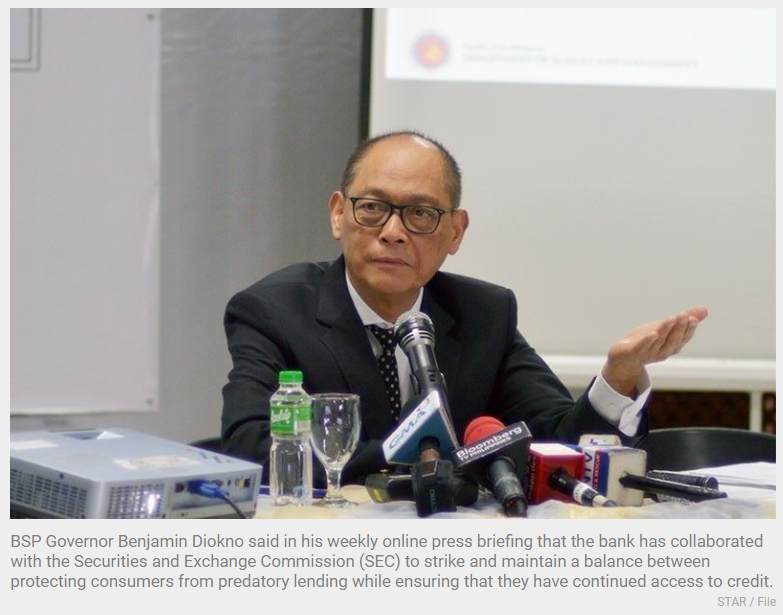Philippines: BSP caps rates on loans to repel predatory lenders
MANILA, Philippines — The Bangko Sentral ng Pilipinas (BSP) has joined the fight against predatory lenders charging an interest rate of as much as 504 percent per annum, as it decided to impose a cap on the charges imposed by lending firms, financing companies and online lending platforms on borrowers.
BSP Governor Benjamin Diokno said in his weekly online press briefing that the bank has collaborated with the Securities and Exchange Commission (SEC) to strike and maintain a balance between protecting consumers from predatory lending while ensuring that they have continued access to credit.
He said the central bank’s Monetary Board approved last Dec. 16 the imposition of ceilings on interest rates and fees on small-value loans extended by lending firms, financing companies and online lending platforms.
The Monetary Board has set a nominal interest rate ceiling of six percent per month, or approximately 0.2 percent per day, for covered loans.
Likewise, the limit on the effective interest rate was pegged at a maximum of 15 percent per month or approximately 0.5 percent per day. The rate includes the nominal interest rate as well as applicable charges such as processing, service, notarial, handling and verification fees, among others, but excludes fees and penalties for late payment or non-payment.
The regulator also set a five percent per month ceiling on penalties for late payment or non-payment on the outstanding scheduled amount due as well as a total cost cap of 100 percent of total amount borrowed. This applies to all interest, other fees and charges, and penalties, regardless of the time that the loan is outstanding.
According to Diokno, the caps apply to unsecured, general purpose loans offered by lending firms, financing companies and online lending platforms not exceeding P10,000 and payable within four months.
The BSP chief noted that the interest rate charged by lending companies soared to 360 percent per annum, or 30 percent per month, between 2016 and 2019 from only 60 percent a year or five percent monthly from 2014 to 2015.
As the pandemic raged last year, Diokno said lending firms further raised the interest rate on loans to 504 percent annually or 42 percent per month.
“The imposition of the interest rate ceilings is also in consideration of the hardships brought about by the COVID-19 pandemic,” Diokno explained.
The BSP chief said the SEC has received 4,363 complaint letters regarding high interest rates and penalties imposed by lending firms and financing companies between January 2020 and May this year.
“These complaints prompted the SEC to seek the BSP’s help in prescribing interest rate ceilings on financing and lending companies,” Diokno said.
He added the imposition of interest rate ceilings is in accordance with Republic Act 9474 or the Lending Company Regulation Act of 2007 and RA 8556 or the Financing Company Act of 1998.
The laws empower the Monetary Board to prescribe maximum interest rates that could be charged by lending firms, financing companies and online lending platforms, in consultation with the SEC and the industry.
As of end 2020, Diokno said the non-performing loan (NPL) ratios of lending and financing companies stood at 26 percent, while the past due loans or delinquency rate was at 30 percent.
“Such high NPL ratios and delinquency rates are often observed for loans that cater to borrowers in the low income bracket and were deemed at risk of rising further due to the economic disruptions caused by the COVID-19 pandemic,” Diokno said.
Diokno said the BSP remains committed to protecting financial consumers and promoting a conducive environment for lenders to viably serve the needs of low-income borrowers amid the pandemic.
Source: https://www.philstar.com/business/2021/12/24/2149753/bsp-caps-rates-loans-repel-predatory-lenders


 Thailand
Thailand




